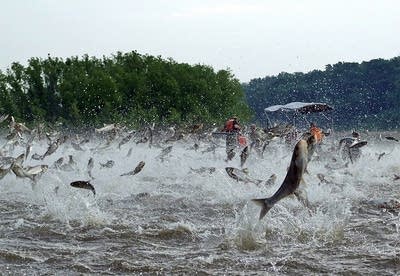Corps rejects closing locks to block Asian carp

Federal officials on Thursday ruled out closing Chicago-area shipping locks on a regular basis, saying it probably would not stop dreaded Asian carp from invading the Great Lakes but could damage the local economy.
The U.S. Army Corps of Engineers said anything short of permanently closing the two locks was unlikely to make a difference in the battle to prevent the voracious fish from gaining a foothold in Lake Michigan. That alternative will be part of a long-range study of whether to sever ties between the Great Lakes and Mississippi River systems, the Corps said.
The decision after months of study dashed the hopes of Michigan and neighboring states, which have unsuccessfully asked the Obama administration, Congress and the Supreme Court to order immediate closure. Supporters fear the locks will provide an easy path to the lakes for bighead and silver carp, which biologists say could starve out native species and ruin the $7 billion fishing industry.
Illinois government and business leaders resisted, saying closure would cripple Chicago shippers and tour boat operators while costing the local economy $4.7 billion over two decades. They questioned the reliability of DNA evidence suggesting the carp have overrun electronic barriers on the Chicago Sanitary and Ship Canal, part of a network of waterways eventually linking the lakes and the Mississippi.
Create a More Connected Minnesota
MPR News is your trusted resource for the news you need. With your support, MPR News brings accessible, courageous journalism and authentic conversation to everyone - free of paywalls and barriers. Your gift makes a difference.
"After rigorous scientific and technical review, it's clear that shutting down Chicago's waterways is not an effective solution," said Rep. Judy Biggert, an Illinois Republican.
Col. Vincent Quarles, commander of the Corps' Chicago district, said the agency considered several scenarios for regularly scheduled lock closures and openings. For example, they could be closed three or four days a week, or every other week.
"In the end, the analysis showed that using measures such as temporary lock closures will do very little to reduce the risk of Asian carp migration," Quarles said.
In two reports issued Thursday, the government promised more modest steps, including completion of a third electronic barrier this year.
The Corps also will place screens near one of the locks, which already has been done at the other, and will study other technologies that could scare away the carp such as placing lights and noisemakers in the waterways, Quarles said.
The Michigan attorney general's office, which has led the push for lock closure, said those measures were too little, too late.
"It's just disappointing seeing things like this being portrayed as real action to confront the Asian carp threat when in reality so much more needs to be done," spokeswoman Joy Yearout said. "It's generating a false sense of security."
Quarles said the locks might be occasionally closed for short periods to assist operations such as the spreading of fish poison in a section of the waterways last month, which killed 100,000 pounds of fish but turned up no Asian carp.
(Copyright 2010 by The Associated Press. All Rights Reserved.)
